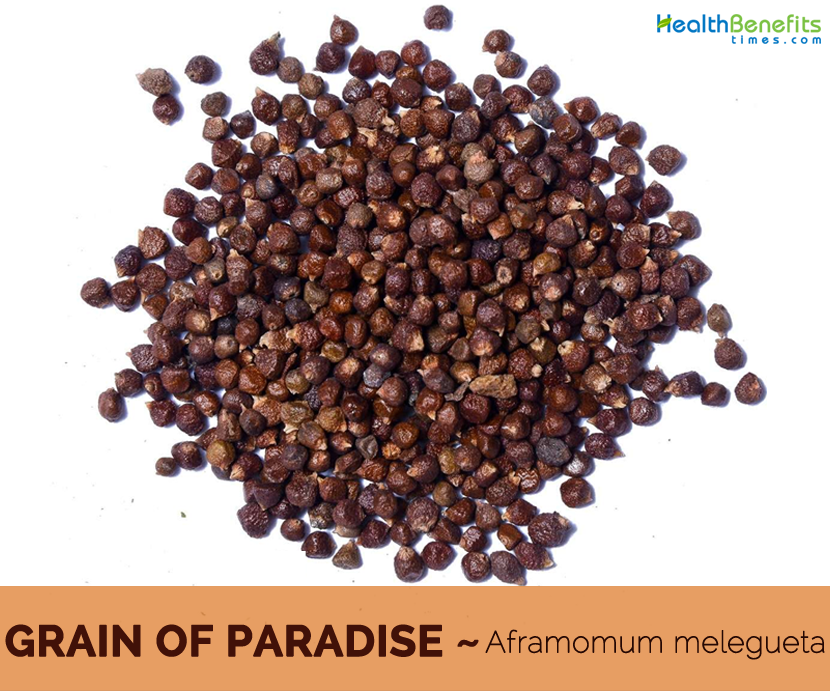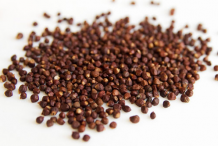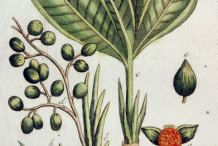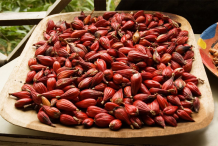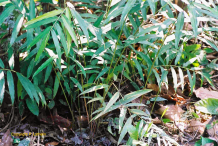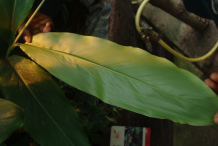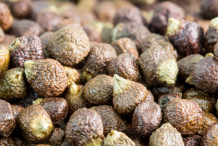Plant Description
Grain of Paradise is an herbaceous perennial plant growing about 4-5 ft. (1.2-1.5 m) tall. It is a tropical reed-like plant of the ginger family, related to the cardamom. Growing from a rhizome, leaves are narrow, bamboo-like. The average leaves are usually 35 cm in length and 15 cm wide, with a well-structured vascular system. Flowers are trumpet-shaped, orange-colored lip and rich pinkish-orange upper part. These beautiful flowers are followed by reddish-brown wrinkled, fig-shaped dried ovoid capsules, almost 5- to 7-cm long, enclosed in leafy bracts. These capsules (pods) consist of several red to brown angular seeds, in a jelly-like pulp. They are pungent in taste. This peppery taste is caused by aromatic ketones. The flowers and rhizomes have a gingery smell. The seeds can be eaten raw or cooked. These seeds have several medical as well as culinary benefits to them. Because of its peppery taste, they are popular option to season food.
History
Grains of paradise are native to the coastal areas of Africa’s Gulf of Guinea which includes today’s countries of Liberia, Ivory Coast, Togo, Nigeria and Cameroon where grains of paradise have a long-standing record of ethno-botanical use. Before the spice trade routes from Western Europe to the East Indies were established, a lively trade of grains of paradise, cubeb and long peppers existed. Oceanic travels to the Spice Islands by the Portuguese, Dutch and English in the 17th century diminished the value and importance of grains of paradise in face of competition of black pepper, clove, mace and nutmeg.
Outside West Africa, grains of paradise are only a minor spice commodity, finding use as a flavoring in alcoholic beverages such as beer, ale and gin. It is an ingredient in ‘raz al hanout’ a Moroccan spice mixture.
Health benefits of grain of Paradise
It has been said that the seeds have some aphrodisiac, digestive and “good luck” properties. In some diets, the black pepper is often replaced by the grains of paradise because it’s less harsh on the digestive system. In Africa, some people will chew on them to be warmer when they feel cold and use them in divination rituals. Listed below are few of the health benefits of using grain of paradise
1. Antimicrobial Properties
Seed extract of grain of paradise has antimicrobial properties due to its constituents of phenolic compounds that are normally used as disinfectants. Several scientific researchers have revealed that Aframomum melegueta extract is broad spectrum and has inhibitory effect on the growth of bacteria like Salmonella typhi, Staphylococcus aureus and Klebsiella pneumonia etc. Use it on a daily basis to get benefited.
2. Treatment of Gastrointestinal Disorders
The seeds extracts of the grain of paradise can be used for treating gastrointestinal disorders such as stomach pain, diarrhea, ulcer and intestinal worms. Regular use of this grain is found quite beneficial for dealing with gastrointestinal problems.
3. Wound Healing
Seeds are crushed and are used for preparing brews for treating and healing wounds. It consists of high amount of tannin that is distinguished by its stringent property and as such it is very effective for healing wounds, treating burns and calming inflamed mucous membrane.
4. Anti-oxidizing Properties
Grain of Paradise seeds are an excellent source of phytonutrients such as terpenoids, alkaloids, flavonoids, tannins, cardiac glycosides, saponin and phenolic compound. They search for free radicals and offer protections against viruses, allergens, microbes, platelet aggregation, tumors, ulcers and hepato toxins in the body. This suggests why it is commonly used in folk medicine for preventing and undertaking intestinal problems.
5. Dermatological Care
Grain of paradise can be used for preparing herbal remedy for treating infectious skin diseases such as measles, chickenpox and smallpox.
6. Anti-inflammatory Properties
Grain of paradise seeds has anti-inflammatory properties due to its constituent of gingerol that prevents the leukotriene and prostaglandins synthesis. Apart from that it offers protection against inflammation of the body.
7. Analgesic Properties
Aqueous extract of the plant is analgesic in nature and can be used for relieving and alleviating pains such as joint pain, toothache, stomach pain, arthritic pain and rheumatoid pain. Use it regularly to get rid from almost all kinds of pains.
8. Digestive Properties
Regular uses of seeds of grain of paradise help easy digestion of food thus preventing constipation and bloating.
9. Stimulating Properties
Due to its stimulating properties and peppery pungent taste, grain of paradise is normally chewed as a stimulant to keep the body alert.
10. Malaria Treatment
Leaves are used for preparing herbal medicines for preventing and treating malaria.
11. Aphrodisiac Properties
Several researches have revealed that the grain of paradise is aphrodisiac in nature thus can be used for stimulating sexual desires.
Traditional medicinal uses of Grain of Paradise
- This herb is considered as a highly effective anti-fungal as well as antimicrobial agent.
- It helps to increase the production of breast milk.
- It has anti-parasitic properties and can be used for cleansing and riding the digestive system of any worm infestation.
- The contents of this herb are also believed to help make the blood purer.
- In many African countries, grains of paradise are used for treating measles and leprosy.
- Hemorrhage that is often related with childbirth may also be dealt with using this herb.
- It can help with indigestion.
- Grains of paradise can also help with heartburn.
- They are also considered as a powerful aphrodisiac.
- This herbaceous plant has also been found to be effectual in treating the deadly condition known as schistomosiasis.
- It is known to be effectual in treating intestinal infestations and infections.
- Some people use this plant’s fruit to cure indigestion and calm heartburn.
- Grains of paradise are recommended for treating intestinal uneasiness, vomiting as well as pain and uneasiness during pregnancy in Chinese herbal medicines.
Culinary Uses
- Add them to curries as well as rich sauces to enhance their flavor.
- They are used in gingerbreads and spice cakes.
- Crush some seeds and use them in combination with vinegar and garlic to rub the mixture on chicken, lamb or pork prior to roasting.
- It is use as a flavoring in alcoholic beverages such as beer, ale and gin.
Other facts
- Grains of paradise seeds can easily replace black pepper.
- They may be chewed to sweeten the breath.
Precautions
- Some of the side effects of this herb include Irritation of the stomach, Irritation of the intestine, and Irritation of the urinary system.
- It is advisable that pregnant and breast-feeding women should stay away from these seeds to be on the safer side or contact a doctor before using them.
Grains of Paradise Dosing
Appropriate dose of grains of paradise depends on several factors such as the user’s age, health, and several other conditions. At this time there is not enough scientific information to determine an appropriate range of doses for grains of paradise. Keep in mind that natural products are not always necessarily safe and dosages can be important. Be sure to follow relevant directions on product labels and consult your pharmacist or physician or other healthcare professional before using.
References:
https://www.itis.gov/servlet/SingleRpt/SingleRpt?search_topic=TSN&search_value=506501#null
http://davesgarden.com/guides/pf/go/193985/
http://www.gbif.org/species/111800039/synonyms
http://www.theplantlist.org/tpl/record/kew-218399
https://plants.usda.gov/core/profile?symbol=AFME
http://bodynutrition.org/grains-of-paradise/
http://theepicentre.com/spice/grains-of-paradise/
https://en.wikipedia.org/wiki/Aframomum_melegueta
https://hort.purdue.edu/newcrop/articles/grains_of_paradise.html
Comments
| Grain of Paradise Quick Facts | |
|---|---|
| Name: | Grain of Paradise |
| Scientific Name: | Aframomum melegueta |
| Origin | Coast in West Africa |
| Colors | Reddish-Brown (Pods) |
| Shapes | Wrinkled, fig-shaped ovoid capsules, almost 5- to 7-cm long (Pods) |
| Taste | Warm, peppery taste |
| Health benefits | Beneficial for Gastrointestinal problems and Wound healing |
| Name | Grains of Paradise |
|---|---|
| Scientific Name | Aframomum melegueta |
| Native | Coast in West Africa |
| Common Names | Melegueta pepper, Alligator Pepper, Ginny Grains, Ginny Papper, Graines, Greater Cardamom, Grenes, Guinea Grains, Guinea Pepper, Guinea Seeds, Maniguetta, Maniguette, Melaguata, Meligetta Pepper, Paradise Grains, Paradise Nuts |
| Name in Other Languages | Amharic: Kewrerima, ko-ra-ri-maa, Korarima, korerīma (ኮረሪማ) Arabic: Khayrbûâ, Qâqullah dhakar, Gawz al-Sudan, Jawz as-Sirk, Jouz al-Sudan, Jouz as-Sudan, Tin al-Fil, jawzat alsuwdan (جوزة السودان) Czech: Aframon rajské zrno, Guinejská zrna, Pepř malaguetský Dutch: Paradijskorrels English: Alligator-pepper, Grains of paradise, Guinea-grains, Guinea pepper, Maleguetta-pepper, Melegueta pepper, Meleguetta pepper. Estonian: Melegeti aframon. French: Graines de paradis, Malaguette, Maniguette, Maniquette, Poivre de Guinée. German: Guineapfeffer, Malagettapfeffer, Meleguetapfeffer, Paradieskörner. Hausa: Chitta Hungarian: Paradicsommag Italian: Grani de Meleguetta, Maniguetta, Grani paradise, grani de paradiso Japanese: Manigetto (マニゲット) Korean: Gi-ni-a-saeng-gang (기니아생강), Kinia-saenggang, mel-ri-gu-e-ta hu-cu, Melligueta huchu (멜리구에타 후추) Lithuanian: Malageta, Rojinis imbierpipiri Polish: Pieprz malagetta Portuguese: Grãos-do-paraíso, Pimenta Guiné, Sementes-do-paraíso Romanian: Grăunțele paradisului Russian: Rajskiye zyorna, Malagvet, Rajskie zerna, Rajskie zôrna, Малагвет, Райские зерна, Райские зёрна Slovak: Aframon rajské zrno, Guinejský kardamon Slovenian: Malguetta poper, Rajsko zrnje Spanish: Malagueta. Turkish: Afrika kakulesi, Itrifil-i sagir†, Itrıfil, İdrifil Twi: Fam wisa, Wisa, Wisa pa Opokuo |
| Plant Growth Habit | Herbaceous perennial plant |
| Growing Climate | Cultivated only in hot humid tropical climates |
| Plant Size | 4-5 ft. (1.2-1.5 m) |
| Leaf | Narrow, bamboo-like. The average leaves are usually 35 cm in length and 15 cm wide, with a well-structured vascular system. |
| Flower | Trumpet-shaped, orange-colored lip and rich pinkish-orange upper part. |
| Fruit Shape & Size | Wrinkled, fig-shaped dried ovoid capsules, almost 5- to 7-cm long, enclosed in leafy bracts. |
| Fruit Color | Reddish-Brown |
| Seed Shape & Size | Small, 3-4 mm (1/8”) in diameter, red-brown irregular seeds |
| Seed Color | Golden Reddish-brown color and as they mature, their color changes to grey. |
| Flavor/Aroma | Woody, almost piney aroma |
| Taste | Warm, peppery taste, strongly of ginger and cardamom |
| Seed | Seeds |
| Health Benefits |
|


